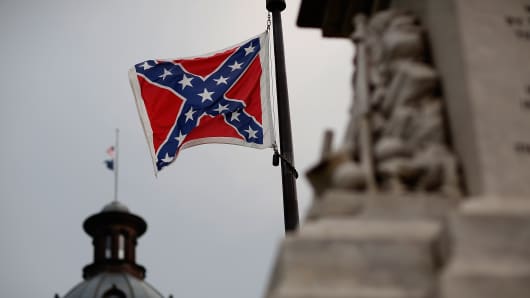Though the political process has stalled, a result of partisan gridlock and fear of upsetting the donor class, corporations are stepping into the void, and they are using their influence to advocate for policy changes on a host of issues ranging from gay marriage to race relations.
It's not always by choice: American consumers today want to know what a business stands for, sometimes vetting brands like presidential candidates. But while most candidates answer to Republican or Democratic constituencies, corporations these days are beholden to the hashtag (#). Social media is forcing them to acknowledge mistakes and take stands on issues or face aggressive activist campaigns and direct mentions on their Twitter feeds.
Read More 2016 candidates, it's time to talk about race
Take VH1's now canceled reality show, "Sorority Sisters." Opponents believed the show cast historically black sororities in a negative light. Before the first episode concluded, the hashtag #BoycottSororitySisters began trending and Twitter users started speaking directly with sponsors, asking them to pull their ad buys.
Honda was one of the first to get called out, with the social media pressure forcing it to respond via Twitter, "Honda does not support the views expressed on this show and we have pulled our ads."
Many other corporations joined the chorus, prompting VH1's decision to drop the show.
Walmart, Apple, Yelp, the National College Athletic Association and Angie's List each paid close attention to the debate over religious-freedom acts — measures that passed in Arkansas and Indiana that would have given businesses the right to refuse service to gay people. These megabrands, fearing reaction from consumers nationwide, took stands against the legislation in their home states, pressuring lawmakers to reverse course.
Read More Trump turns GOP race into reality-TV circus
Corporate pressure to influence policy comes from the right as well as the left. In 2014, Hobby Lobby sued the health department over Obamacare and won the right to refuse to offer contraception to workers on religious grounds, without facing tax penalties.
Perhaps Starbucks has been the boldest corporation taking on social issues. Recognizing the trending #BlackLivesMatter movement, it dove right in with its own #RaceTogether campaign. The move was maligned by critics, but it did prompt a national conversation on race from a corporate point of view.
By my metrics, the campaign was a success. Starbucks was one of the first companies to talk about race in the context of a spate of police shootings of unarmed African Americans. As complex as it is divisive, race is not easy for anyone talk about, let alone a huge multinational corporation with shareholders. African Americans have long watched big business exhibit a willingness to show support for gay rights issues, but remain silent on racial issues.
If it was for fear of their bottom lines, Corporate America should take note of Starbuck's second-quarter earnings for 2015, which showed an 18-percent increase in revenue.
Read MoreTime to ban criminal-record box on job applications
Since the church shootings in South Carolina, more corporations have begun to exert their influence around race issues. Before the state's lawmakers even began debating the removal of the Confederate flag from statehouse grounds, Walmart and Amazon made the decision to discontinue sales of the flag. The South Carolina Chamber of Commerce and the South Carolina Manufacturing Alliance that includes members such as BMW, Boeing, DuPont, and Lockheed Martin rallied behind the scenes, placing a call to Gov. Nikki Haley to support the removal of the flag.
I believe Gov. Haley was authentically in favor of removal, but in the face of Citizens United and Super PACs, it's hard for any politician to stand firm on their convictions. Corporations, with the fear of the hashtag resonating in their boardrooms, are more motivated to bend to the will of the people.
Commentary by Mike Muse, co-founder of Muse Recordings. Muse has served on President Barack Obama's National Finance Committee as well as finance committees of Sens. Cory Booker and Kirsten Gillibrand and Mayor Bill de Blasio. He is currently serving on the Democratic National Finance Committee and Hillary Clinton's Finance Committee. He was recently appointed by New York City Mayor Bill de Blasio to serve on the Board of Advisors for the Mayors Fund to Advance New York City. Follow him on Twitter @IamMikeMuse.


